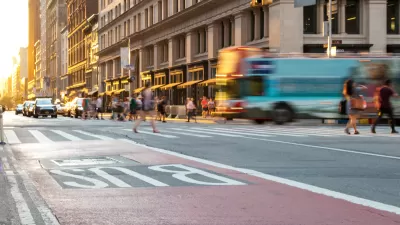New York Mayor Bill de Blasio gathered Police Commissioner William Bratton and Transportation Commissioner Polly Trottenberg to make the potentially historic policy announcement: the Vision Zero plan, which treats all traffic deaths as preventable.
Matt Flegenheimer provides the details and the context of the potentially historic policy announcement: the country's most populous city, defined in part by its zooming cabs, popular public transit, and, yes, jaywalking, is setting a goal to make the streets safe for all users. “Our lives are literally in each other’s hands...Our children’s lives are in each other’s hands,” said Mayor de Blasio at the press conference announcing the Vision Zero plan on Tuesday, February 19, 2014.
Although the Vision Zero plan was a campaign promise by Mayor de Blasio, this was the first time the mayor announced the details of the plan. Some of the policy proposals, as reported by Flegenheimer:
- "Perhaps the most significant changes involve the New York Police Department, whose officers will increase precinct-level enforcement of speeding."
- Lowered citywide speed limit to 25 miles per hour from 30 (requires state approval).
- The installation of red-light and speed-tracking cameras (requires state approval).
- "The Taxi and Limousine Commission will form an 'enforcement squad,' with a focus on dangerous cabdrivers, and begin a pilot program to install 'black box' data recorders in the city’s taxis and limousines."
- The city’s Transportation Department will overhaul 50 intersections and corridors each year.
Perhaps the most telling soundbite from the article was this statement from Mayor de Blasio about the focus of the policy: “The central problem is related to our vehicles.”
FULL STORY: De Blasio Outlines Steps to Eliminate Traffic Deaths

Maui's Vacation Rental Debate Turns Ugly
Verbal attacks, misinformation campaigns and fistfights plague a high-stakes debate to convert thousands of vacation rentals into long-term housing.

Planetizen Federal Action Tracker
A weekly monitor of how Trump’s orders and actions are impacting planners and planning in America.

In Urban Planning, AI Prompting Could be the New Design Thinking
Creativity has long been key to great urban design. What if we see AI as our new creative partner?

King County Supportive Housing Program Offers Hope for Unhoused Residents
The county is taking a ‘Housing First’ approach that prioritizes getting people into housing, then offering wraparound supportive services.

Researchers Use AI to Get Clearer Picture of US Housing
Analysts are using artificial intelligence to supercharge their research by allowing them to comb through data faster. Though these AI tools can be error prone, they save time and housing researchers are optimistic about the future.

Making Shared Micromobility More Inclusive
Cities and shared mobility system operators can do more to include people with disabilities in planning and operations, per a new report.
Urban Design for Planners 1: Software Tools
This six-course series explores essential urban design concepts using open source software and equips planners with the tools they need to participate fully in the urban design process.
Planning for Universal Design
Learn the tools for implementing Universal Design in planning regulations.
planning NEXT
Appalachian Highlands Housing Partners
Mpact (founded as Rail~Volution)
City of Camden Redevelopment Agency
City of Astoria
City of Portland
City of Laramie



























